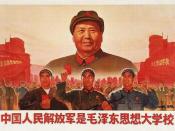The Cultural Revolution, initiated by Chinese Communist Party (CCP) chairman Mao Zedong during his last decade in power (1966-76) was supposed to reinvigorate the Chinese revolution. Looking at the deterioration of the Soviet Communist model, Mao took steps to halt ChinaÃÂs progression down the same path and whilst doing so he exposed China to a period of great civil unrest and confusion. During the course of this essay I will seek to analyse the causes of the Cultural Revolution by highlighting relevant examples from the process.
Whilst in a state of semi-retirement Mao was becoming increasingly frustrated with at the amount of bureaucracy within the CCP. In the early 1960ÃÂs, ChinaÃÂs increasing tension with the Soviet Union had made Mao more fearful that China would follow the same communist route. As far as he was concerned, Communism in the Soviet Union had gone awry and that there was an increasing political bourgeoisie present.
With the economic recovery process underway to alleviate the aftermath of the Great Leap Forward, Mao was becoming increasingly marginalised within the party and he became worried that there were increasing capitalist and anti-social tendencies appearing in China. After the Eighth Plenum in which the failures of the Great Leap Forward were discussed in full, Mao began to feel increasingly to blame. In reaction to this he began to formulate the ideas which would be the precursor to the Great Cultural Revolution:"The struggle that has arisen at Lushan is a class struggle. It is the continuation of the life-or-death struggle between the two great antagonists of the socialist revolution during the past decade." (Chinese Law and Government: 1968. pp 73-74)The struggle that Mao was experiencing within the CCP himself was a microcosm of the party as a whole:ÃÂOld cadres who had joined the Party while it was...


